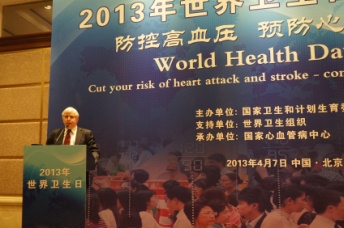
Dr Ma Xiaowei,
Distinguished guests,
Ladies and gentlemen,
Good afternoon! Happy World Health Day!
On behalf of the World Health Organization, we are honored to join the National Health and Family Planning Commission, the National Centre for Cardiovascular Disease, China Hypertension League, and all of you, on this special occasion.
To mark World Health Day on 7 April, WHO is calling for intensified efforts to prevent and control hypertension, also known as high blood pressure.
Hypertension is a major contributor to heart disease and stroke - which together make up the world’s number one cause of premature death and disability. High blood pressure can also cause kidney failure, blindness, rupture of blood vessels and brain impairment.
Worldwide, high blood pressure is estimated to affect more than one in three adults and contributes to more than nine million deaths every year. In developing countries, this proportion is even higher, and is increasing.
Many people do not know they have high blood pressure because it does not always manifest symptoms, making it a silent killer.
Therefore increasing public awareness is key, as is access to early detection. Raised blood pressure is a serious warning sign that significant lifestyle changes are urgently needed.
Hypertension can be prevented. And prevention saves lives. Controlling high blood pressure, together with other risk factors, is the main way to prevent heart attack and stroke, which have a major impact on the health system and the economy, and most importantly, on the individual and the family.
People should know and monitor their blood pressure levels – and take advice from health-workers if they need to reduce it.
People can cut the risks of high blood pressure by consuming less salt, eating a balanced diet, engaging in regular physical activity, and avoiding tobacco use.
Reducing salt intake is one of the most effective ways to reduce the risk of heart disease and stroke. WHO recommends that adults should eat less than 5 grams of salt per day. Unfortunately, in most parts of China this is much higher.
But some people will still need to take prescription medication to control their blood pressure. This is why it is important to consult qualified health workers.
To increase public awareness, systems and services need to be in place to promote universal health coverage and support healthy lifestyles. Early detection of hypertension is critical, as is access to good quality medicines. These medicinces are effective and inexpensive, and vital, particularly at the primary care level.
Everyone needs to be part of the solution. Policymakers can help by raising taxes on tobacco, by banning tobacco marketing and indoor smoking, and by warning people about tobacco's harms.
Industry can contribute to the solution, for example, by reducing salt in processed food and making essential diagnostics and medicines more affordable.
Civil society, including self-help community health groups also have an important role to play in helping to address high blood pressure.
Ladies and gentlemen,
Global efforts to tackle the challenge of non-communicable diseases, or NCDs, have gained momentum since the 2011 United Nations Political Declaration on the prevention and control of NCDs.
WHO is developing a Global Non-communicable Diseases Action Plan 2013-2020 to provide a roadmap to Member States to address NCDs, including hypertension reduction targets.
China has made significant progress in NCD prevention and control, including hypertension prevention. China is an important part of this global movement to end the burden of death and disease caused by non-communicable diseases.
Ladies and gentlemen,
On this World Health Day, let's pledge to work together: individual, family, civil society, industry and policymakers, to prevent and control hypertension.
On this World Health Day, and every day, know and control your blood pressure.
